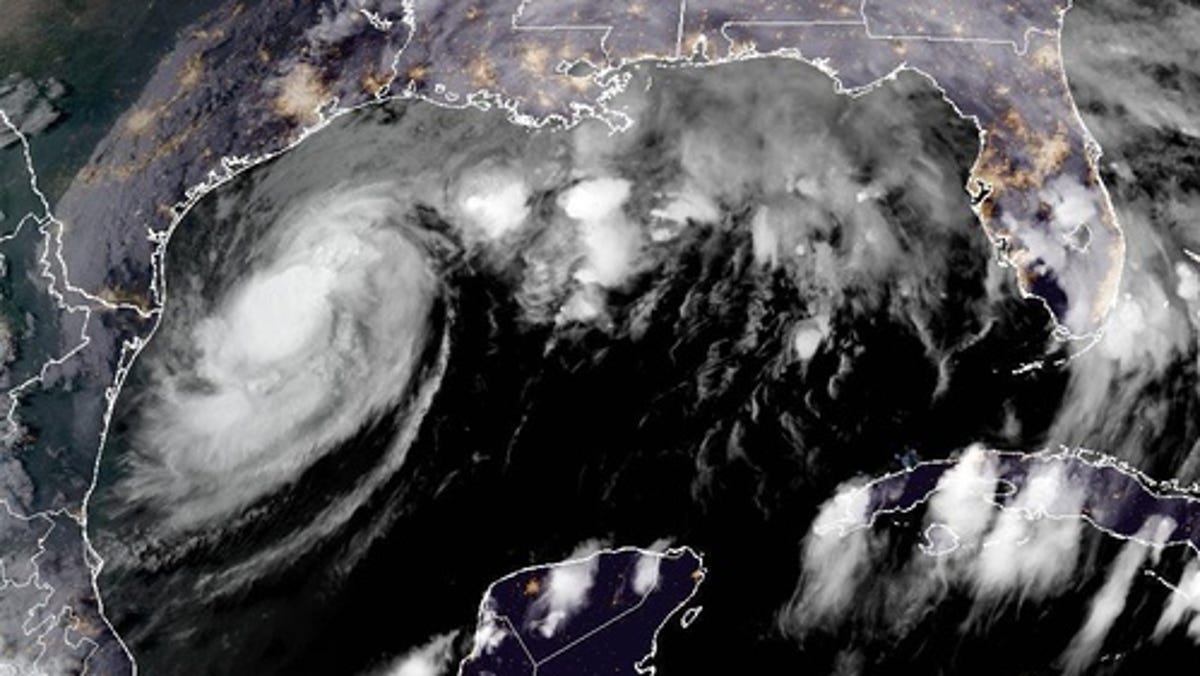Hurricane Francine Approaches Louisiana as Coastal Residents Evacuate: Live Updates
Residents in Louisiana prepared for landfall on Wednesday as Hurricane Francine gained strength, posing a threat to the Gulf Coast with destructive winds, heavy rainfall of approximately a foot, and storm surges reaching up to 10 feet in certain areas.
The hurricane, categorized as Category 1, displayed maximum sustained winds of 90 mph early Wednesday morning, with forecasts indicating it could strike central Louisiana by the afternoon or evening. The National Weather Service in New Orleans warned of various impacts, including coastal flooding, strong winds, heavy rain, and potential tornadoes starting early Wednesday and lasting through Thursday morning.
According to a National Hurricane Center advisory, “Life-threatening storm surge and hurricane-force winds are anticipated to begin in Louisiana later today.”
Enhancements in the storm’s strength were probable on Wednesday, with meteorological models suggesting Francine might approach or reach Category 2 levels. Factors like increased wind shear and dry air may prevent further strengthening up to landfall, but the storm will still represent a “significant risk” after arriving on Louisiana’s coastline, the center stated.
Post landfall, Francine is expected to progress into Mississippi and then upwards into the Mississippi Valley, subsequently becoming a tropical depression and arriving in Memphis by Thursday night.
Latest Updates:
∎ As of early Wednesday, Francine was situated roughly 245 miles from Morgan City, Louisiana, per the hurricane center.
∎ On Tuesday night, President Joe Biden approved an emergency declaration for Louisiana following a formal request from state officials. This federal declaration will facilitate disaster relief and response efforts.
∎ In Texas, Governor Greg Abbott mentioned a “high probability” of hazardous storm surges and urged coastal residents to heed local officials’ advice, including possible evacuation orders.
Residents Advised to ‘Hunker Down’
The National Weather Service office in New Orleans alerted those in the areas along and west of the Pearl River to prepare for strong damaging winds, particularly in bayou parishes and parts of the lower river parishes where hurricane-force winds are expected. Additionally, residents should anticipate power outages and damage to trees, mobile homes, and rooftops.
In a tweet, the office stated, “Conditions will worsen throughout the day! Ensure all preparations are completed urgently! Prepare to hunker down and stay sheltered overnight!”
Rainfall Impact from Francine
Francine is projected to deliver total rainfall between 4 to 8 inches, with possible localized amounts reaching up to 12 inches across southeastern Louisiana, Mississippi, the far southern parts of Alabama, and the Florida Panhandle through Thursday night. This rainfall may cause “considerable” flash and urban flooding.
Mandatory and voluntary evacuation orders are in place for several Louisiana parishes, including Terrebonne and Lafourche. Shelters have been established in Terrebonne Parish. In Lafourche Parish, mandatory evacuations apply to individuals in a FEMA-supplied housing unit or state-issued RV camper.
Oil and Gas Operations Halted in Louisiana Ahead of Francine
The approaching storm has prompted oil and gas companies in the Gulf of Mexico to cease operations. About 412,070 barrels per day of oil production, approximately 24% of total production, has been halted, and personnel from 130 production platforms have been evacuated, as reported by the Bureau of Safety and Environmental Enforcement on Tuesday.
Reports indicate that about 26% of Gulf natural gas production has gone offline. The Gulf region represents around 15% of U.S. oil output and 2% of natural gas production, according to Reuters.
Insiders at Exxon Mobil Corp’s Baton Rouge, Louisiana refinery informed Reuters that production would be reduced due to Francine’s anticipated path, which is expected to pass just east of the facility. The company plans to lower production to as low as 20% of the refinery’s 522,500 barrel-per-day capacity by Wednesday as Francine approaches landfall.
Residents Advised to ‘Develop a Strategy’
Louisiana Governor Jeff Landry, who declared a state of emergency earlier, urged citizens to “create a plan, listen to local authorities, and stay updated through local news” to help lessen the effects of Francine.
Certain areas within the state may experience storm surges between 5 to 10 feet, leading to widespread flooding and accumulations of rain up to a foot in specific areas. Mandatory evacuations have been enforced in various coastal regions of Texas and Louisiana.
Some schools have shut down, and sandbags are being distributed to residents.
Francine: The Third Hurricane to Hit the Gulf Coast This Year
Francine has the potential to become the third
This year, two hurricanes made landfall on the Gulf Coast: Debby near Steinhatchee, Florida, and Beryl close to Matagorda Bay, Texas.
According to AccuWeather, the last hurricane that struck Louisiana was Ida in 2021. “From 2019 to 2021, Louisiana experienced eight tropical storms and hurricane landfalls, which included significant hurricanes Laura and Ida,” said meteorologist Alyssa Glenny in an online report.
Francine is the fourth hurricane of the 2024 Atlantic hurricane season. On average, the fourth Atlantic hurricane typically forms around September 16, as noted by Phil Klotzbach, a senior hurricane researcher at Colorado State University.
Contributors: Doyle Rice, YSL News; Reuters

